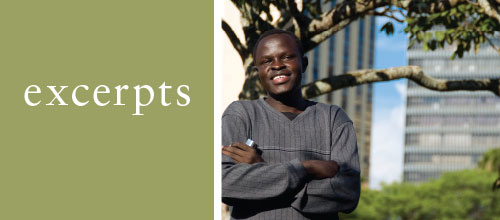Excerpts

Joseph Akol Makeer is a graduate of North Dakota State University with a degree in criminal justice. He plans to pursue a master's degree. Ultimately he hopes to return to southern Sudan to be part of bringing justice to people there. He is looking for a job in law enforcement and finishing a movie about his life. He has written a book, From Africa to America: The Journey of a Lost Boy of Sudan, about his experiences when, at age 10, he walked across the desert to Ethiopia and later to a Kenyan refugee camp. Ten years later, Makeer was reunited with some of his siblings and was able to bring them to the United States, where he continues to raise them. He is married and has three children.
We, the people like myself who are here today, we are the lucky ones. We get food, we get electricity, and a lot of things, so we are the fortunate ones.
Because I am here in America, I can eat what I want because I have money and I have access to health care.
There are those who are poor because they are being victimized, maybe by their leaders or by war actually. So these people are the group who are in need the most.
I was born in Sudan but I don't think that they have me in the record because I was born in the village and the government was only focusing on those who are in the north.
My kids are American. My son was telling me "How come Daddy you are a lost boy and I am American?" I didn't tell him much but I told him that it's a matter of you are not a lost boy because I am with you. I am a lost boy because I was without my parents. He has no knowledge of what it is. I think he will learn it more.
I just graduated last May so I am so glad that I made it and I set a good example to my siblings, to my tribe, and to my family. And also I'm so happy that my sister is in National Guard. She was telling me that she's going to protect our family. When I ask her why is it that you need to go to the ND National Guard, she said, "I want to be part of the protecting, part of the army so that I will protect part of our family." She is very smart.
The country where I came from, there are no laws protecting people. I am one of the people who believe that there must be justice in the world and I should be part of it.
Most people are not educated in Sudan and it is very difficult to change your life.
Whenever there is a difficulty you have to overcome it. You have to keep trying and you will be successful. That's what I always share with my siblings and I will be sharing with my kids in the future when they grow up.
I think war doesn't solve the problem in any way because every human being is very competitive, and human beings cannot be disciplined by violence, like torturing. It makes someone to be so bitter, to commit a crime again, or to be so bitter to the world that he cannot help again. So I think war is the worst thing in the world. If we talk, if we share, if we tell the truth, if we respect each other gender to gender, man to woman, boy and girl, all of those. If we do those things I don't think there will be war.Peace is one of the things that people should be focusing on.
I don't care whether we're Sudanese or Kenyan, Ugandan, South African or whatever, we need to come as one continent that can solve our own problems rather than asking always help from outside.
Some of us witnessed our parents being killed and if we start talking about the war that will pop up in our minds again and we will see them and get very depressed and some cry. So we avoid it all and don't talk about it. We talk about the present, daily life. I know a person should be forgiven. Forgiveness is one of the other things, like justice, the good things. Like if you put those who kill my parents, if you put them in jail for their whole lives, that's a justice, but if they can agree, or if they apologize, that would be more powerful than just to throw them behind bars for all that time.
The best thing is for a person who commits a crime to say sorry, so you can know what he did. If he can speak from his heart, from the bottom of his heart, that he made something wrong, I think peace and justice are the same on that point. If you throw someone in jail and his family suffers, that's a terrible cost. You caused other victims, like the kids and the family.

































